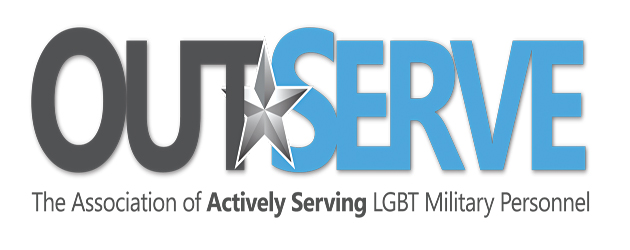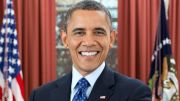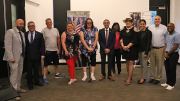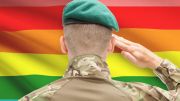
Neil MacInnes-Barker, a gay Air Force veteran, also serves on the LGBT Commission for the City of Cambridge.
Photo courtesy of MacInnes-Baker
By: Chuck Colbert/TRT Reporter–
Two leading organizations in the successful effort to repeal the ban on openly gay military service have announced they are merging. News of Service members Legal Defense Network and Out Serve’s joining forces broke on July 2 after the boards of directors of each group voted unanimously to combine forces.
In announcing the merger, expected to take effect within three months, OutServe and SLDN issued a joint press statement and posted online a short video, featuring Army veteran Aubrey Sarvis, who serves as SLDN’s executive director, and Josh Seefried, co-director and co-founder of OutServe.
“The mission of achieving full equality in our military is not yet achieved,” Sarvis said on camera, explaining the boards’ decision. “There is more work to do.”
“We decided we could do the job much better as one single, effective organization, representing LGBT service members and veterans,” added Seefried.
“Working together, focused on the mission together, combing our resources, combining our energies, we know we will be stronger and more effective,” said Sarvis.
Under the terms of the agreement reached on Sunday, July 1 by the two boards, the merger will be completed as soon as specific contingencies are removed, including outstanding legal, financial, and structural elements.
The organizations are aiming to finalize the merger and be operational by the next board meetings of the two groups, scheduled to take place October 26-28 in Orlando, Florida.
SLDN & its work for LGBT members of the armed forces
Based in Washington, D.C., SLDN is the senior partner in the new team. For more than 20 years, the nonpartisan and nonprofit organization has provided free quality and confidential legal services to LGBT members of the armed forces and veterans who experienced harassment and faced discharges under the now-defunct “Don’t Ask, Don’t Tell.”
With 12 full-time employees and one part-time staffer, SLDN is also a policy organization that stepped up lobbying efforts on Capitol Hill when President Barack Obama called on Congress to repeal DADT. Sarvis, who was brought on board a few years ago to help repeal DADT, announced in January that he’s planning to step down from SLDN.
SLDN’s 2011 annual report showed end-of-year net assets at nearly $714,000. For that same reporting period, SLDN spent a little more than $3 million, with 81 percent of expenditures going to program services.
DADT Helps Gays and Lesbians some; no Transgender service yet
DADT repeal took effect at the stroke of midnight, September 19, 2011, lifting the ban on openly gay, lesbian, and bisexual service. Transgender military service is still prohibited.
Other disparities result from the 1996 Defense of Marriage Act, which prohibits federal recognition of same-sex marriage.
Consequently, LGB service members who are legally married in same-sex unions are denied more than 1,000 marriage-related benefits at the federal level, as well as some military benefits and support afforded to opposite-sex couples and their families.
OutServe and its network of LGBT service members
Only two years old, OutServe is the new team’s junior partner. And yet the association, which began as an underground network of LGBT active duty service members, now claims more than 5,500 active duty service members and 50-plus chapters worldwide and has become a credible and strong voice for LGBT equality in the armed forces.
Launched on July 26, 2010, OutServe is nonpartisan and nonprofit. The association is currently based in San Francisco, with one staffer and a 2011 budget of $140,000. But that is projected to be higher for 2012.
The association publishes the monthly OutServe magazine in both print and digital editions. A year ago, a limited number of Army and Air Force bases allowed for distribution of the publication in their respective exchanges.
Gay troops positive about the merger
Overall, news of the OutServe-SLDN merger has been positive within the LGBT community and among gay troops. For example, Military Partners and Families Coalition voiced support for the consolidation, noting the “combine[d] forces and resources” will “create the strongest organization possible to advocate for LGBT service members and veterans,” according to a statement.
“We are looking forward to our continued partnership with OutServe-SLDN while they build on what they’ve accomplished for LGBT service members and veterans,” said Ariana Bostian-Kentes, MPFC president.
Founded in 2011 by a group of partners of active duty U.S. armed forces service members stationed stateside and overseas, MPFC provides support, resources, education and advocacy for LGBT military partners and their families.
Also nonpartisan and nonprofit, MPFC is based in Washington, D.C.
Transgender concerns
Nonetheless, at least one transgender rights activist voiced concerns.
“What the merging organizations didn’t say, in their press release, was what ‘LGBT equality’ means in the context of military service,” said Autumn Sandeen, an out trans woman and retired Navy veteran based in San Diego.
“If the new organization doesn’t take its media opportunities to say words to the effect of ‘We support open service for trans service members in the military, and we support enactment of full anti-discrimination protections for service members on the basis of gender identity and sexual orientation,’ then it’s much more likely that nothing will get done on military LGBT equality issues,” she added.
Still, pointing to OutServe magazine, Sandeen expressed hope. Recently the publication introduced a transgender voice, with Brynn Tannehill, a former Navy aviator, lieutenant commander, and Naval Academy alumna, writing for the magazine from the perspective of a transgender former military officer.
“I’m looking to see what she writes about open service in the future, and this will tell us to a certain extent the direction of the combined organization on open service for trans service members,” said Sandeen.
Cambridge resident Neil MacInnes-Barker, a former staff sergeant, who served the Air Force from 1989 to 1994, before and during DADT, also voiced concerns about transgender persons. “While the transgender population still lags behind in protections in the private sector, they are all but non-existent in the lives of service members and veterans,” he said. “Both OutServe and SLDN can work harder at reversing this.”
“The creation of a new organization is a great time to focus on the transgender individuals who are unable to serve and transgender veterans who are isolated,” said MacInnes-Barker. “Transgender civilians, service members and veterans still are the brunt of some of the most violent, and often ignored, violations of rights and protections. I hope when [the two organizations] do merge, that they will take more seriously the needs of the transgender community.”
Altogether, MacInnes-Barker said work remains to be done for both active duty members of the armed forces, as well as veterans. “Repealing DADT is but one small first step,” he said.
For example, a big need is “to correct the inequality in the benefits for those serving,” MacInnes-Barker explained. “Benefits afforded heterosexual service members, such as off-base housing and child dependent benefits for couples with children should be available for same-sex couples.”
Additionally, “There are survivor benefits and a host of other needs for LGBT veterans,” he said.
Finally, “We need to meet the needs of our warriors when they face discrimination and challenges in their civilian communities,” said MacInnes-Barker. “We all know how aggressive some states are socially and legally towards the LGBT community. These services and needs don’t end at discharge.”
© Copyright. Chuck Colbert. All rights reserved.






